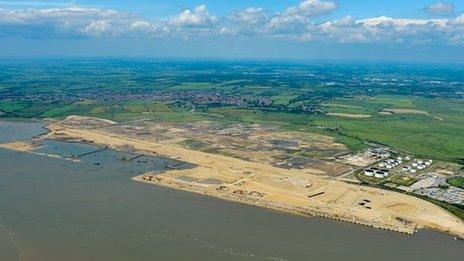London Gateway: Will the UK's new deep sea port sink or swim?
- Published

London Gateway is located on the River Thames in Thurrock, Essex - approximately 20 miles from London
A vast deep-sea container port is being built 20 miles down the River Thames from London, in Thurrock, Essex - but how will it fare when it opens next year?
"According to the GPS [Global Positioning System], we're about 400m [1,300ft] out into the Thames. Here we're on the newest part of England," says the director of civil engineering at the London Gateway project, Andrew Bowen, as he parks on a recently deposited mound of sand and points to a ship surrounded by pipes in the middle of the Thames.
"The dredger is just offshore and is pumping material to create the new land," he says.
The dredger is like a floating vacuum cleaner, sucking up sand and silt from the river bed to deepen the river channel ready for large ships. It then deposits the material on the building site to create land on which the deep-sea port can be built.
London Gateway is being built by the Dubai-owned company DP World at a cost of £1.5bn ($2.35bn), on the site of a former oil refinery in Essex.
The first ships should start arriving by the end of next year and when it is completely finished it will be able to unload six of the biggest container ships in the world at the same time.
Most of the port's customers will be bringing imported goods from China and the Far East to retailers in the UK.
London Gateway chief executive Simon Moore says: "We're just 20 miles away from Europe's largest economic zone, so this is the closest that we can really get to London."
He says the London Gateway plan is reminiscent of hundreds of years ago when London had a flourishing port nearer the city.
"We're bringing London and the UK's hub port back home again to the River Thames."
Bad timing?
But Neil Davidson, a ports expert with the consultancy company Drewry, who has worked for London Gateway, is cautious about the new London port, which gained planning permission before the global financial crisis hit.
"The timing isn't ideal because London Gateway is coming on stream just when the economy is flat. And this is one of the problems," he says.
"The public inquiry for London Gateway was 10 years ago. Well, 10 years ago the outlook for the UK container port industry was very, very different."
But London Gateway is more than just a port. The developers are also building what they claim will be Europe's biggest logistics park - a huge area set aside for warehouses to handle the imported cargo.
At the moment, whatever their ultimate destination, most of the goods imported into the UK are taken by road, and some by rail, to big distribution centres in the Midlands, the traditional logistics hub for the country.
However, at present some goods are being driven north from southern ports to Midlands distribution points, only to be sent down south again.
London Gateway is hoping some companies will want to move their distribution centres to the park at the new port and in doing so, change the logistics map of Britain.
However, whatever gains London Gateway makes, other areas of the UK could lose out - notably the Port of Felixstowe in Suffolk, 75 miles away, which has dominated British container trade for the past 30 years.
Established rivals
Clemence Cheng, managing director of the Central Europe division at Hong Kong-based Hutchison Port Holdings, which owns Felixstowe, says it welcomes competition but Felixstowe will still be the bigger port, even when London Gateway is fully finished.
Felixstowe also recently opened a deep-sea terminal to take the largest vessels.
Mr Cheng rejects the argument companies will be attracted to London Gateway by its closer proximity to the South East and London.
"Now when you look at it, will a manufacturer want to take their truck load of cargo on the M25 motorway, [or] through a very congested railway to go back into London?
"We're the port for Britain. We're not only for London - London is 70 miles away from Felixstowe - but we're servicing the entire country."
The ports get their business from the giant shipping lines that use them, but London Gateway has not yet signed up any shipping companies as clients.
The Danish-owned Maersk is the biggest container ship operator in the world, but it is currently committed to Felixstowe.
Maersk's UK and Ireland operations manager, Mark Cornwell, says London Gateway will be "an outstanding facility", but Maersk remains committed to Felixstowe.
The world economic outlook is uncertain for everyone at the moment and the <link> <caption>shipping industry is facing a tough year</caption> <url href="http://www.bbc.co.uk/news/business-17362509" platform="highweb"/> </link> .
However, some British ports, such as the Port of Tyne in the north-east of England, have produced record profits in recent years and ports expert Neil Davidson is confident the prospects for ports are better than for their shipping-sector customers.
"Container shipping is a much more homogenous industry, whereas ports are much more unique in what they can offer, and the profitability reflects that."
<bold>In Business will broadcast on </bold> <link> <caption>BBC Radio 4 </caption> <url href="http://http://www.bbc.co.uk/programmes/b006s609" platform="highweb"/> </link> <bold>on Thursday, 2 August at 20:30 BST and Sunday, 5 August at 21:30 BST. </bold>
<bold>You can listen again on the Radio 4 </bold> <link> <caption>website</caption> <url href="http://www.bbc.co.uk/programmes/b01l8n7y" platform="highweb"/> </link> <bold> or via the World of Business </bold> <link> <caption>download</caption> <url href="http://www.bbc.co.uk/podcasts/series/worldbiz" platform="highweb"/> </link> .
- Published11 May 2011
- Published28 September 2011
- Published4 October 2011